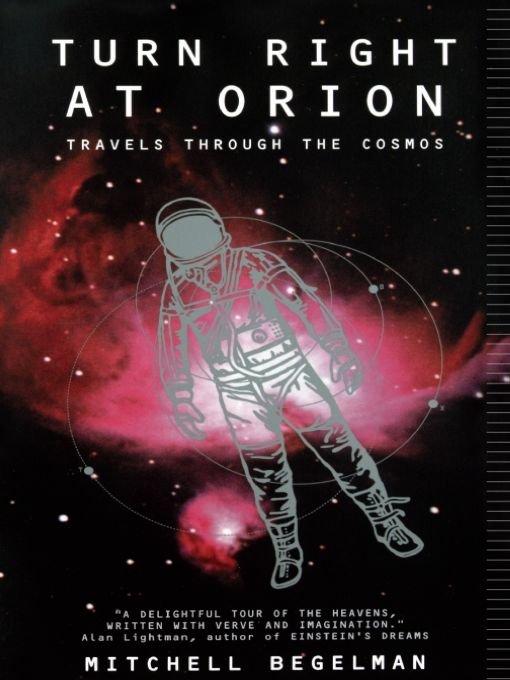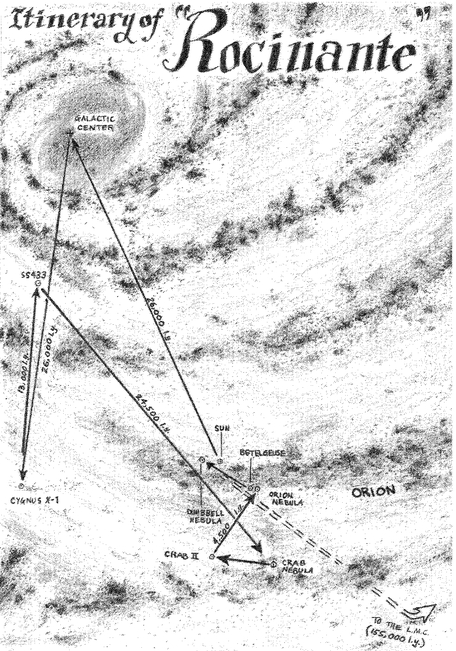Turn Right At Orion
Read Turn Right At Orion Online
Authors: Mitchell Begelman



Table of Contents
Â
Â
Â
Â
Â
Â
Â
Â
OTHER BOOKS BY MITCHELL BEGELMAN
Gravity's Fatal Attraction
(with Sir Martin Rees)
(with Sir Martin Rees)
To my parents
INTRODUCTION
Translator's NoteI came across the following memoir under distressing circumstances: at an auction of surplus documents to raise funds for a new storage wing at the Global Library. The thought of this valuable information being sold to the highest bidder is appalling, but such are the times we live in. The author appears to come from a well-studied planet in a galaxy about 60 million light-years away, known to its erstwhile occupants as “Earth.” If we are correct in our attribution, he belongs to a civilization that warrants more than a passing mention in our Core Curriculum because of the early and curious way in which its technology developed. What appears to clinch the identification is the author's reference, in the very first paragraph, to a scientist known (in his language) as Kepler. Of course, information on this pivotal figure was eventually disseminated cosmos-wide in Earth's copious (though brief) transmissions, but the subtle “ownership” expressed by the author suggests that he and Kepler have common cultural origins. There are also linguistic clues, turns of phrase that seldom show up in adaptations of Earth's language by neighboring civilizations. Fortunately, our records of their transmissions have enabled us to produce what we feel must be an accurate reconstruction of their language; this forms the basis for my translation.
Several things are remarkable about this document. The author's mixture of experiential metaphor with scientific theory is highly unusual; most records we possess of Earth's achievements in astrophysics indicate a greater detachment on the part of the observer. The science is generally of high quality, with understandable
lapses. Notably, there are significant gaps in the author's comprehension of what causes stars to explode, his grasp of pulsar physics leaves much to be desired, and his interpretation of how jets of plasma escape from the vicinity of black holes is sketchy at best. But the glimpses we are granted into this exotic being's direct responses to cosmic phenomena more than compensate for these quibbles. Although the narrator seems curiously reservedâperhaps because of his separation from his home planetâthe emotional reactions he does express are strikingly similar to those recorded by our own early explorers. We are swept up in his compulsion, even though the initial reasons for his journey (and his journal) are never satisfactorily explained. Solitary space travel has never been the norm in our culture, and we are at a loss to interpret the list of reasons given. Do we take them at face value? Or is the author unwilling or unable to divulge his real motivations? Is he, perhaps, an exile from his home planet? Or a scout, for a planned mission of colonization or emigration, who has “gone native”?
lapses. Notably, there are significant gaps in the author's comprehension of what causes stars to explode, his grasp of pulsar physics leaves much to be desired, and his interpretation of how jets of plasma escape from the vicinity of black holes is sketchy at best. But the glimpses we are granted into this exotic being's direct responses to cosmic phenomena more than compensate for these quibbles. Although the narrator seems curiously reservedâperhaps because of his separation from his home planetâthe emotional reactions he does express are strikingly similar to those recorded by our own early explorers. We are swept up in his compulsion, even though the initial reasons for his journey (and his journal) are never satisfactorily explained. Solitary space travel has never been the norm in our culture, and we are at a loss to interpret the list of reasons given. Do we take them at face value? Or is the author unwilling or unable to divulge his real motivations? Is he, perhaps, an exile from his home planet? Or a scout, for a planned mission of colonization or emigration, who has “gone native”?
Whatever his motivations, the narrator displays an admirable command of technology. He recognizes that the only effective method of space travel involves motion at very close to the speed of light. He is adept at manipulating this motion to maintain the structural integrity of both his craft and himself, even when he finds he has misjudged the harsh conditions of space. We find frequent evidence of his resourcefulness, such as his use of hibernation to circumvent the limitations imposed by his species's brief life span.
In
Turn Right at Orion,
we are treated to a journey of great scope, far longer than initially planned, and are privy to the narrator's discoveries and dilemmas as he travels farther and farther afield. In fact, some passages (descriptions of the jet and extended galactic halo, in particular) actually suggest that he was in the center of
our
galaxy when he transmitted this memoir.
Turn Right at Orion,
we are treated to a journey of great scope, far longer than initially planned, and are privy to the narrator's discoveries and dilemmas as he travels farther and farther afield. In fact, some passages (descriptions of the jet and extended galactic halo, in particular) actually suggest that he was in the center of
our
galaxy when he transmitted this memoir.
The title of the memoir was chosen by its author and is somewhat problematical. We understand that “Orion” refers to a region of vigorous star and planet formationâlong since
dissipatedâthat was located about 1500 light-years from the author's home planet at the time of his departure. The author's visit to this region, recounted in the lengthy fourth section of the memoir, clearly made a strong impression on him. I regard it as the turning point in his story. But we have absolutely no idea what is meant here by the phrase
turn right;
such a phrase makes little sense in the context of cosmic navigation. We can only surmise that it is a colloquialism or an obscure cultural reference.
dissipatedâthat was located about 1500 light-years from the author's home planet at the time of his departure. The author's visit to this region, recounted in the lengthy fourth section of the memoir, clearly made a strong impression on him. I regard it as the turning point in his story. But we have absolutely no idea what is meant here by the phrase
turn right;
such a phrase makes little sense in the context of cosmic navigation. We can only surmise that it is a colloquialism or an obscure cultural reference.
Whereas in more prosperous (and enlightened) times the publication of such a document without exhaustive footnotes and a gloss would have been unthinkable, there is little support for such scholarly effort today. However, to discover and rescue such a prize and
not
to share it, in whatever form, would seem an even greater outrage. I offer my translation of this manuscript unadorned. Make of it what you will.
not
to share it, in whatever form, would seem an even greater outrage. I offer my translation of this manuscript unadorned. Make of it what you will.


If I have one complaint about the center of the Milky Way, it is that I found it nearly impossible to get a decent night's sleep. The sky teemed with blue-white stars, each as brilliant as a full moon. There must have been thousands of them, and I, sensitive to light as I am, felt pinned from all sides by their radiance. It made no difference that the portals of my craft could easily be covered to block out the glare; the knowledge that I was bathed in the light of this enormous star cluster was enough to keep me awake. Had I been able to sleep, I might have managed to convince myself that this long voyage was an entertaining dream, my answer to Johannes Kepler's
Somnium.
That great astronomer's allegorical excursion to the Moon, circa 1611, had been a favorite of mine as a studentâI once translated it from the Latin myselfâand since then I have often wondered what subliminal role it played in triggering my wanderlust. But this was no dream. The sensations were too acute and the discomfort too real to be so easily dismissed as imaginary.
Somnium.
That great astronomer's allegorical excursion to the Moon, circa 1611, had been a favorite of mine as a studentâI once translated it from the Latin myselfâand since then I have often wondered what subliminal role it played in triggering my wanderlust. But this was no dream. The sensations were too acute and the discomfort too real to be so easily dismissed as imaginary.
It's funny how I dwell on the memories of such small annoyances nearly as often as I mull over the great themes that have emerged during my travels. In my mind I will always be able to revisit the searing, metallic glare that confronted me near the Crab Nebula's pulsar; the infuriating, impenetrable shroud of dust that blocked my explorations of the giant star Betelgeuse; the seasickness that overtook me as I surfed through heavy turbulence to the nucleus of the galaxy from which I now write. The grander episodes have been internalized, I suppose, and no longer serve to mark the specific events of this journey so much
as to characterize my own progress as its witness. Among these episodes were the life-and-death encounters: a terrifying incident near the second black hole I visited, my escape from a supernova explosion in the Magellanic Clouds, the barrage of rogue boulders that nearly destroyed my craft as I tried to watch the creation of a planet. These dramas, any of which could have cost me dearly, I seem to have taken in stride. Each has helped to crystallize an aspect of this journeyâto broaden my appreciation of relationship among phenomena that I scarcely imagined could be connected in so many ways.
as to characterize my own progress as its witness. Among these episodes were the life-and-death encounters: a terrifying incident near the second black hole I visited, my escape from a supernova explosion in the Magellanic Clouds, the barrage of rogue boulders that nearly destroyed my craft as I tried to watch the creation of a planet. These dramas, any of which could have cost me dearly, I seem to have taken in stride. Each has helped to crystallize an aspect of this journeyâto broaden my appreciation of relationship among phenomena that I scarcely imagined could be connected in so many ways.
Funny, too, that a few periods of enforced wakefulness should have disturbed me. After all, 85 percent of my journey has been spent in hibernationâa necessity, given the journey's length. I have been traveling, now, for more than 200 years by my clock. I amâor wasâan astrophysicist of the early twenty-first century. I think back on that time frequently, and it is only with the greatest difficulty that I can accept the fact that (almost certainly) every last one of my colleagues has been dead for 60 million years! This trip has occupied less than half of my conscious lifetime, and part of my psyche cannot grasp the passage of so much time on Earth.
Yet there is nothing paradoxical about the distortions of time that I have had to create in order to make this trip. Because my craft has accelerated to within a hair's breadth of the speed of light (without ever exceeding it), small amounts of time pass for me while eons elapse for Earth and most other bodies in the cosmos. I am a manipulator of time, though I am doing nothing that is not readily comprehensible to every physics student on my planet.
Other books
AD-versaries by Ainsworth, Jake
Make It Right by Shannon Flagg
Boot Hill Bride by Lauri Robinson
Chaosbound by David Farland
A Moment by Hall, Marie
Enduring Light by Alyssa Rose Ivy
High Heels and Homicide by Kasey Michaels
Evermore by Brenda Pandos
Dark Waters (Elemental Book 1) by Rain Oxford
Running Out of Time by Margaret Peterson Haddix